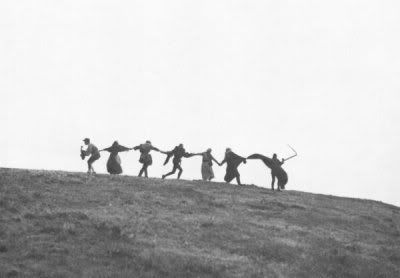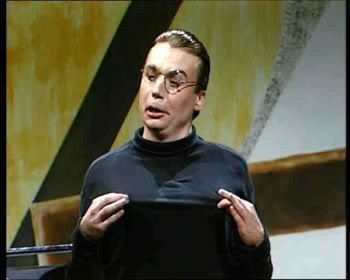bergman, antonioni and "the death of" things
well, if you've been within a dozen clicks of my friends page lately, you've probably heard that on july 30th, the film world was dealt the peculiar blow of ingmar bergman and michelangelo antonioni dying on the same day (july 30th). neither filmmaker is particularly dear to me-- i guess i'm not much of a modernist/transcendentalist-- but both were forces to be reckoned with. i can't think, off-hand, of a more inventive examination into the nature of death than bergman's the seventh seal... and as someone used to feeling awkward and alienated at parties, i feel a real affinity with the twilight wallflowers wandering through antonioni's la notte.

there's been a lot of tributes floating around on-line, obviously. and as much as i've enjoyed reading them, i feel a strange ambivalence about their tone in general. earlier today, cut_dead posted an interesting response to a.o. scott's tribute to the two filmmakers in the new york times. scott's article irked me quite a bit. but more importantly, it characterized a certain kind of lip-service people feel obligated to adopt when "the old masters" are mentioned.
what is the appropriate response to this news? to mourn the deaths of two bright individuals, or to lament the end of an era? scott's article certainly chooses the latter. and for my money, bergman and antonioni made the kind of work that actively encourages his sort of lamentation. in a way that bothers me.
there's a certain modernist tradition that revels in suffering. as a painter, i know it from picasso's angst-ridden insistence that the work of art is always an act of destruction prior to being an act of creation. and this can be enormously worthwhile. i welcome the challenge of leaving my comfort zone; it's crucial to do so, in fact. but an approach can become an ideology, and an ideology can become an aesthetic. there's a peculiar pleasure to bergman's compulsive insistence on the barbarism of a world-without-god. and i'll be damned if the hollow bourgeoisie of l'avventura don't suffer in style, as well.

as some of you might recall, i don't believe in nothingness. at its worst, my world is catastrophic-- and idiotic-- but never empty. so it's always an awkward fit for me when grand modernist texts like l'eclisse present the world as if its own hollowness had birthed it. and this ideology runs throughout the "canon" of the 50's and 60's-- the idea that stylized malaise reveals mystical truths. when i watch the early films of bergman and antonioni, i feel an obligation to suffer that is no longer about wrestling with new forms and ideas, and is instead about accepting an equation in which illness becomes equivalent to life itself.
so when two intriguing heavyweights-- each having spent a half-century sculpting their own spiritual and cultural maladies into legitimate works of art-- suddenly kick the bucket, people who aren't typically inclined towards pompous modernist proclamations like the title of scott's tribute ("before them, films were just movies") start letting the "high brow" horseshit fly. and accordingly, us masochists must bow our philistine heads in shame-- transformers ticket-stub in hand-- and begin whipping up laundry lists of how and why "the golden age" has come and gone without us. i say fuck that shit. with all due respect to ingmar bergman, there's a hell of a lot left to listen to besides "the silence of god."

according to a.o. scott:
"the idea that a difficult work had special value - that being challenged was a distinct form of pleasure - enjoyed a prestige, at the time (of bergman/antonioni), that is almost unimaginable today. We would rather be teased than troubled, and the measure of artistic sophistication is cleverness rather than seriousness."
... i would argue that the problem isn't one of "our" artistic sophistication, but of scott's inability to imagine. the great films are still out there; but the scope and geography are different. which is to say that jia zhang ke's vision of a malnourished beijing isn't any more "clever" than bergman's existential swedish countryside, nor any less "serious"... and the almost-plotless, tone-poem-impressionism of claire denis' l'intrus is every bit as stylistically challenging as antonioni's red desert... and the reason i know about these films in the first place (as hinted at by cut_dead in his post) is because a rabid, file-sharing, blogging, ranting-and-raving cinemania has turned the internet into an unprecedented salad bar of arthouse cinema. enter "stan brakhage" into youtube and see what comes up if you don't believe me.
the point is that, while american film critics bitch and moan about michael bay and "torture porn" and little miss sunshine, elsewhere on the planet-- in southeast asia and iran particularly-- people are still pushing the envelope as hard as ever. and, by and large, they're doing so without allegiance to the anemic fatalism that's kept me from really embracing antonioni or bergman.
film has been around for a little over a hundred years. and when ingmar bergman treats a shadowy face like a vast rural landscape... or when michelangelo antonioni makes a long-take feel like a ghost just slid through the theatre... i'm reminded of the youth of the artform. its nearly newborn potential. the great films being made today are toddlers in the scheme of things. so why do we treat them like fossils?

there's been a lot of tributes floating around on-line, obviously. and as much as i've enjoyed reading them, i feel a strange ambivalence about their tone in general. earlier today, cut_dead posted an interesting response to a.o. scott's tribute to the two filmmakers in the new york times. scott's article irked me quite a bit. but more importantly, it characterized a certain kind of lip-service people feel obligated to adopt when "the old masters" are mentioned.
what is the appropriate response to this news? to mourn the deaths of two bright individuals, or to lament the end of an era? scott's article certainly chooses the latter. and for my money, bergman and antonioni made the kind of work that actively encourages his sort of lamentation. in a way that bothers me.
there's a certain modernist tradition that revels in suffering. as a painter, i know it from picasso's angst-ridden insistence that the work of art is always an act of destruction prior to being an act of creation. and this can be enormously worthwhile. i welcome the challenge of leaving my comfort zone; it's crucial to do so, in fact. but an approach can become an ideology, and an ideology can become an aesthetic. there's a peculiar pleasure to bergman's compulsive insistence on the barbarism of a world-without-god. and i'll be damned if the hollow bourgeoisie of l'avventura don't suffer in style, as well.

as some of you might recall, i don't believe in nothingness. at its worst, my world is catastrophic-- and idiotic-- but never empty. so it's always an awkward fit for me when grand modernist texts like l'eclisse present the world as if its own hollowness had birthed it. and this ideology runs throughout the "canon" of the 50's and 60's-- the idea that stylized malaise reveals mystical truths. when i watch the early films of bergman and antonioni, i feel an obligation to suffer that is no longer about wrestling with new forms and ideas, and is instead about accepting an equation in which illness becomes equivalent to life itself.
so when two intriguing heavyweights-- each having spent a half-century sculpting their own spiritual and cultural maladies into legitimate works of art-- suddenly kick the bucket, people who aren't typically inclined towards pompous modernist proclamations like the title of scott's tribute ("before them, films were just movies") start letting the "high brow" horseshit fly. and accordingly, us masochists must bow our philistine heads in shame-- transformers ticket-stub in hand-- and begin whipping up laundry lists of how and why "the golden age" has come and gone without us. i say fuck that shit. with all due respect to ingmar bergman, there's a hell of a lot left to listen to besides "the silence of god."

according to a.o. scott:
"the idea that a difficult work had special value - that being challenged was a distinct form of pleasure - enjoyed a prestige, at the time (of bergman/antonioni), that is almost unimaginable today. We would rather be teased than troubled, and the measure of artistic sophistication is cleverness rather than seriousness."
... i would argue that the problem isn't one of "our" artistic sophistication, but of scott's inability to imagine. the great films are still out there; but the scope and geography are different. which is to say that jia zhang ke's vision of a malnourished beijing isn't any more "clever" than bergman's existential swedish countryside, nor any less "serious"... and the almost-plotless, tone-poem-impressionism of claire denis' l'intrus is every bit as stylistically challenging as antonioni's red desert... and the reason i know about these films in the first place (as hinted at by cut_dead in his post) is because a rabid, file-sharing, blogging, ranting-and-raving cinemania has turned the internet into an unprecedented salad bar of arthouse cinema. enter "stan brakhage" into youtube and see what comes up if you don't believe me.
the point is that, while american film critics bitch and moan about michael bay and "torture porn" and little miss sunshine, elsewhere on the planet-- in southeast asia and iran particularly-- people are still pushing the envelope as hard as ever. and, by and large, they're doing so without allegiance to the anemic fatalism that's kept me from really embracing antonioni or bergman.
film has been around for a little over a hundred years. and when ingmar bergman treats a shadowy face like a vast rural landscape... or when michelangelo antonioni makes a long-take feel like a ghost just slid through the theatre... i'm reminded of the youth of the artform. its nearly newborn potential. the great films being made today are toddlers in the scheme of things. so why do we treat them like fossils?